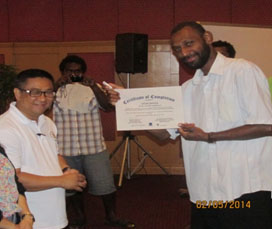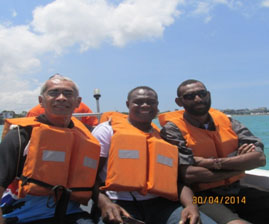Related News

A staff member of the Institute of Applied Science, Mr Apisai Bogiva, recently returned from a one week Basic training on Ecosystem Approach to Fisheries Management that was held in the province of Bohol in the Philippines from the 28th April to 2nd May, 2014. Mr Bogiva was among a group of eight individuals from Fiji who were invited to participate, share experiences and also learn a management tool that could be implemented locally to enhance current practices to improve fisheries management. Other members of the team included five government representatives, one community representative and one NGO representative including the Provincial Administrators, Ra. IAS is leading a government / NGO integrated coastal management project in Ra province under the Coral Triangle Pacific initiative.
Participants from Timor Leste, PNG, Vanuatu and Solomons were also part of the training. ADB through its Coral Triangle Initiative project in the five countries is hoping that each country will adopt this management tool but more importantly to build capacity within each country project. According to Mr Bogiva, apart from sharing the technical skills acquired with his colleagues, it will also boost and extend his work within the Institute. Many of the tools discussed were similar to what he had learned at IAS. The training is an eye opener for him, ‘I was able to connect my practical, on the ground experience with the big picture and theories of a holistic fisheries management’.
Three major lessons learnt from this training were;
He will continue to work through his managers at Institute of Applied Science (IAS) on how he can assist the Ra Integrated Coastal Yaubula Management Committee adapt the EAFM tool.
The training was funded by the Asian Development Bank (ADB) and jointly facilitated by the World Wide Fund for Nature (WWF), Bureau of Fisheries and Aquatic Resources of the Philippines and ECO-FISH, a local NGO in the Philippines.

To conclude, this training is in line with the USP Strategic Plan 2013-2018, Priority Area 6 (Our People), Objective 24 stating to ‘Ensure the development of regional talent and the development of staff’ with the purpose of integrated and holistic management of fisheries.